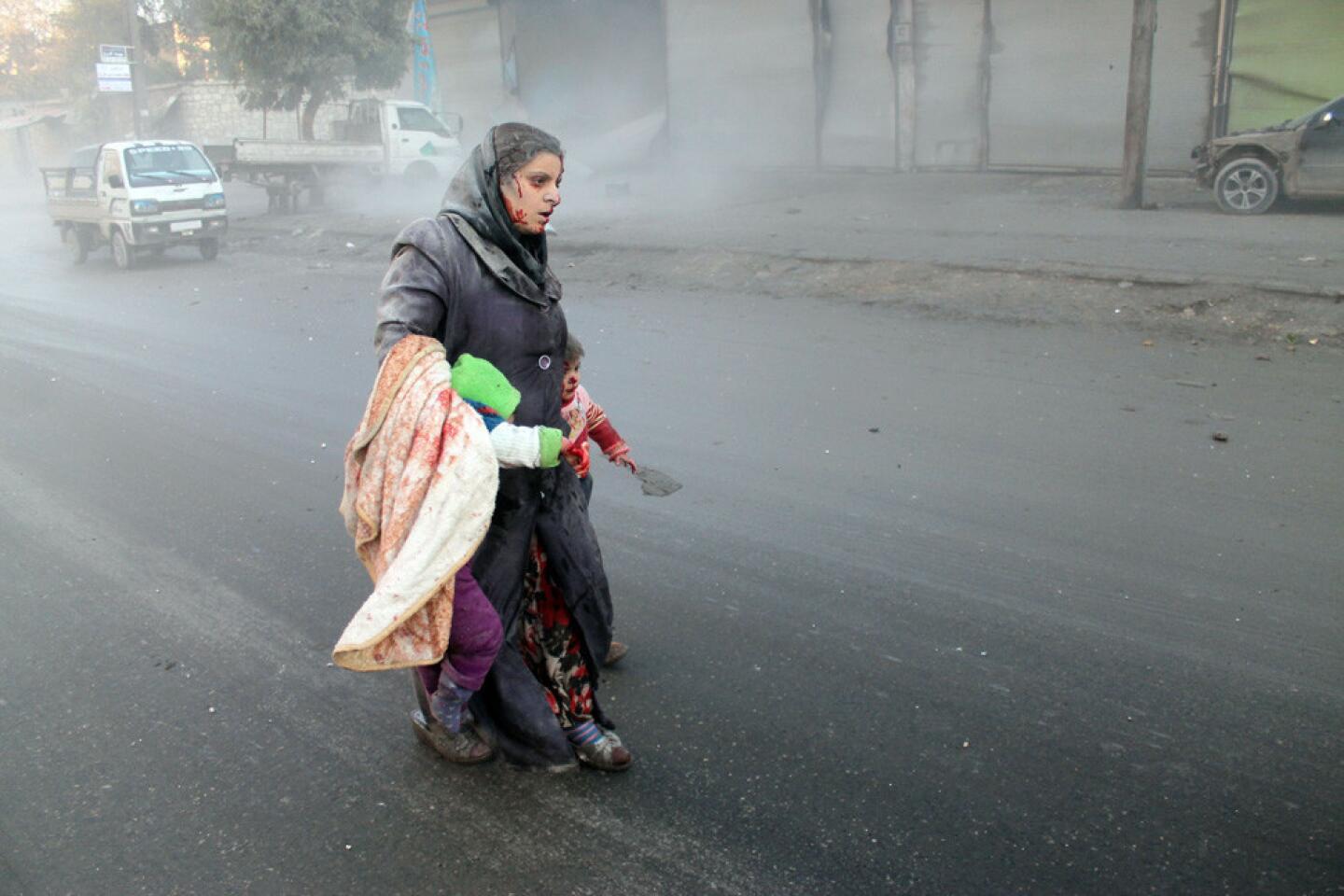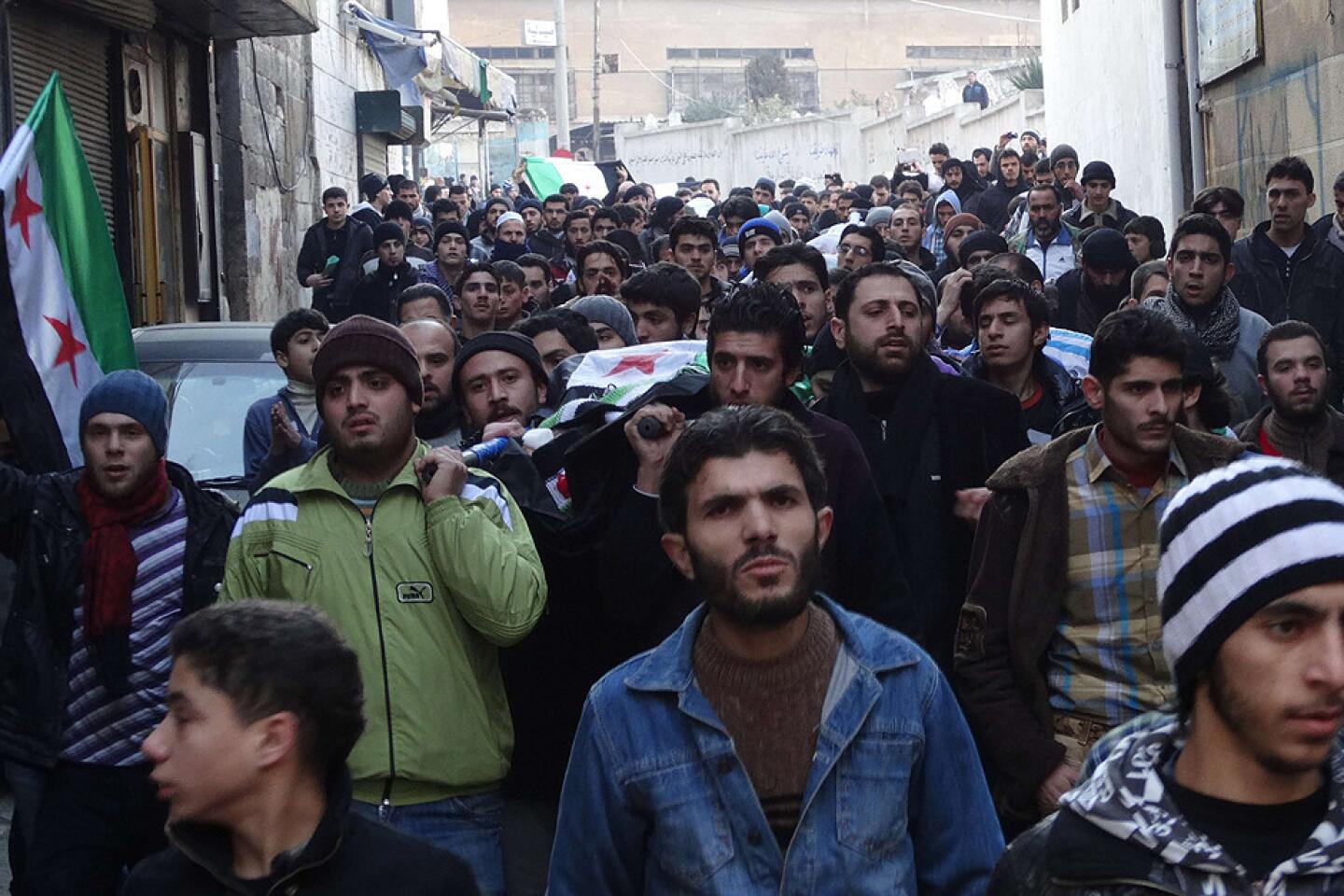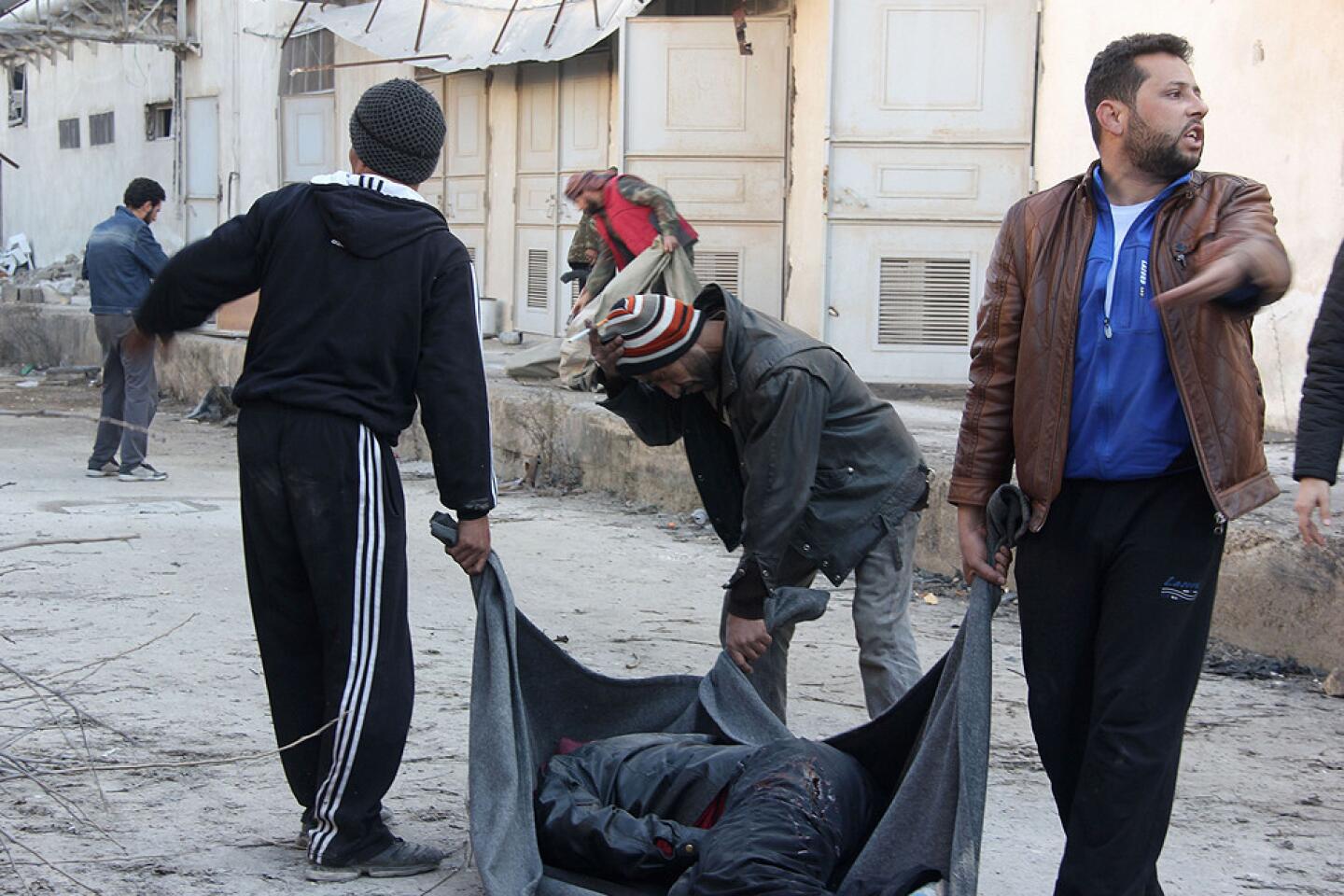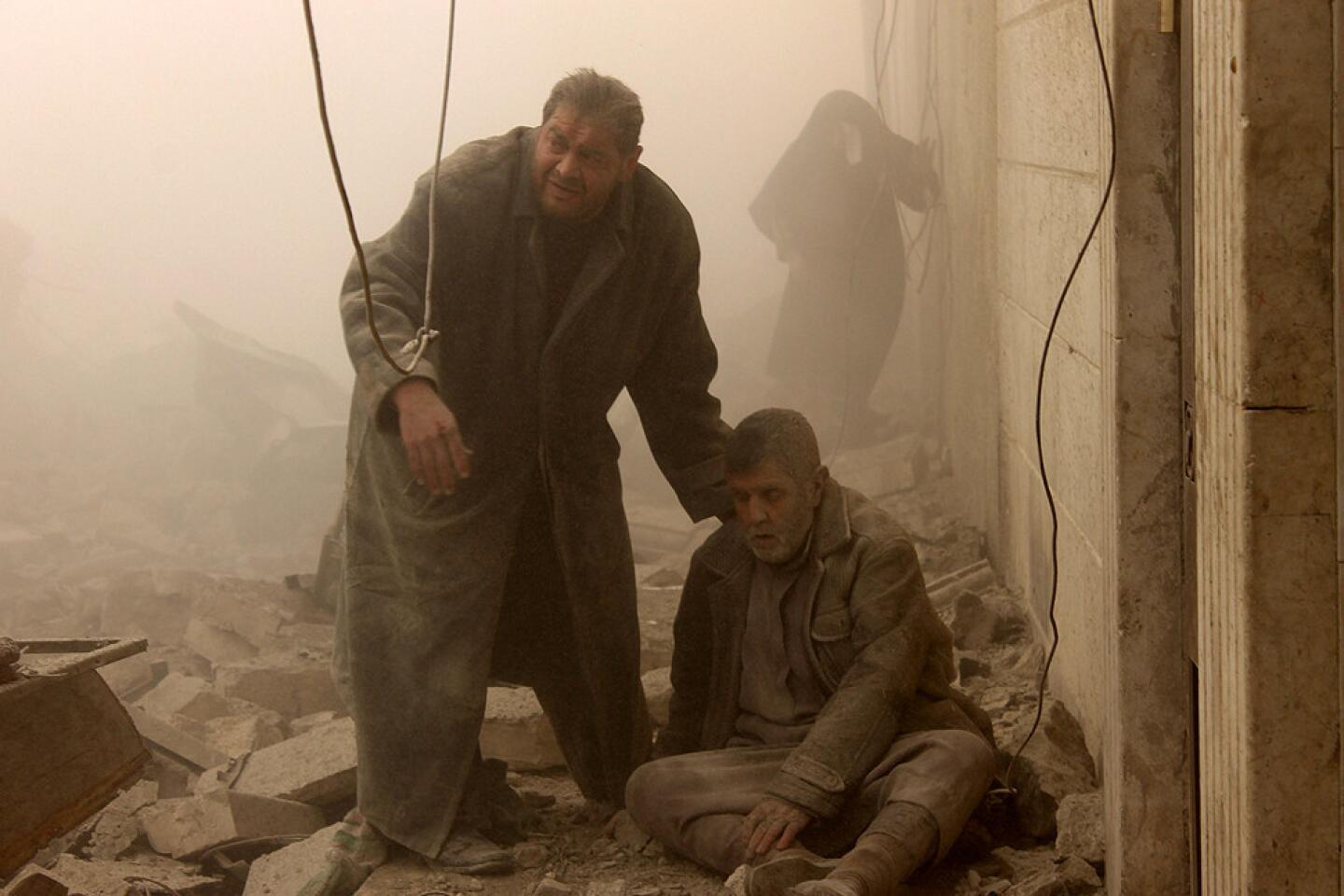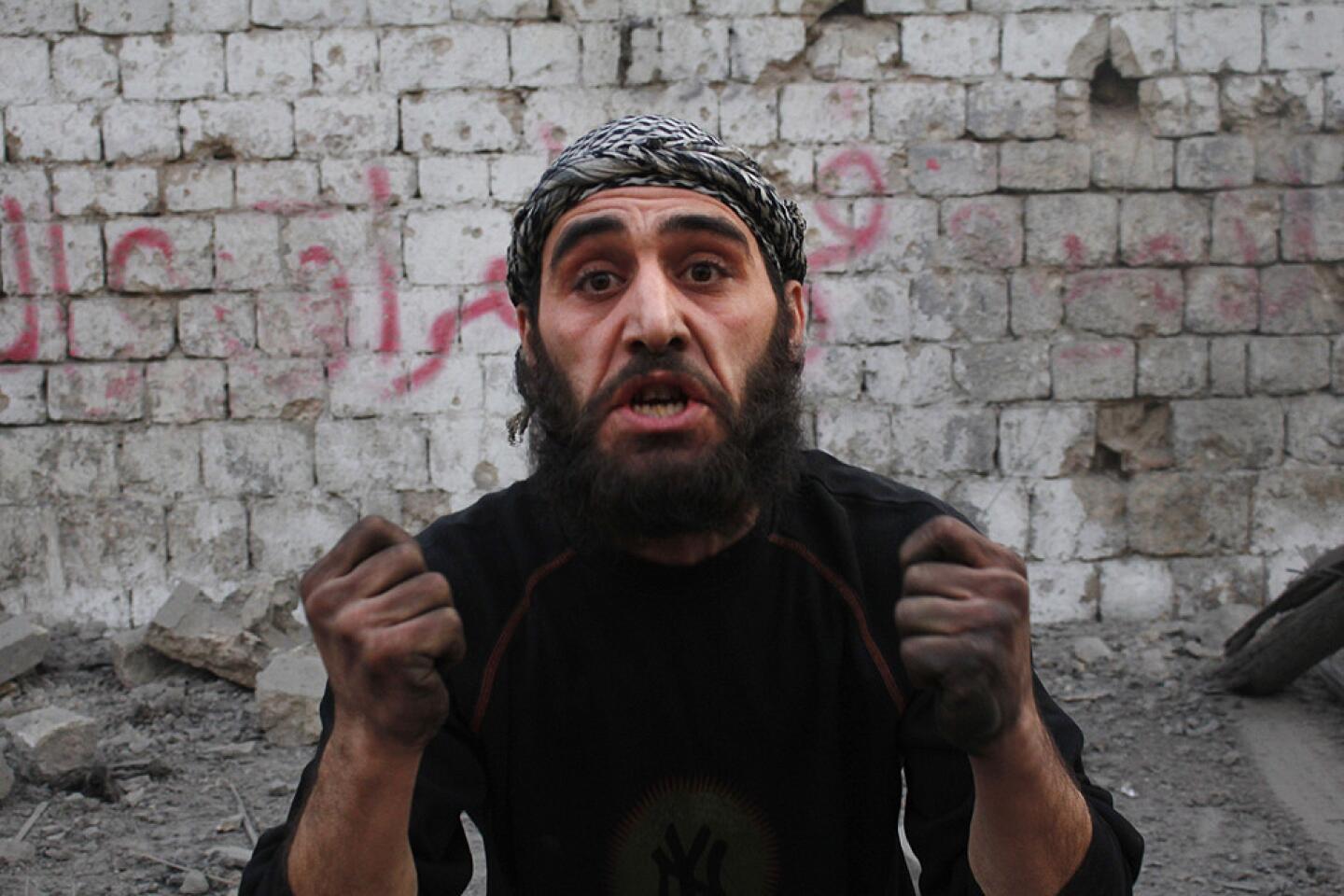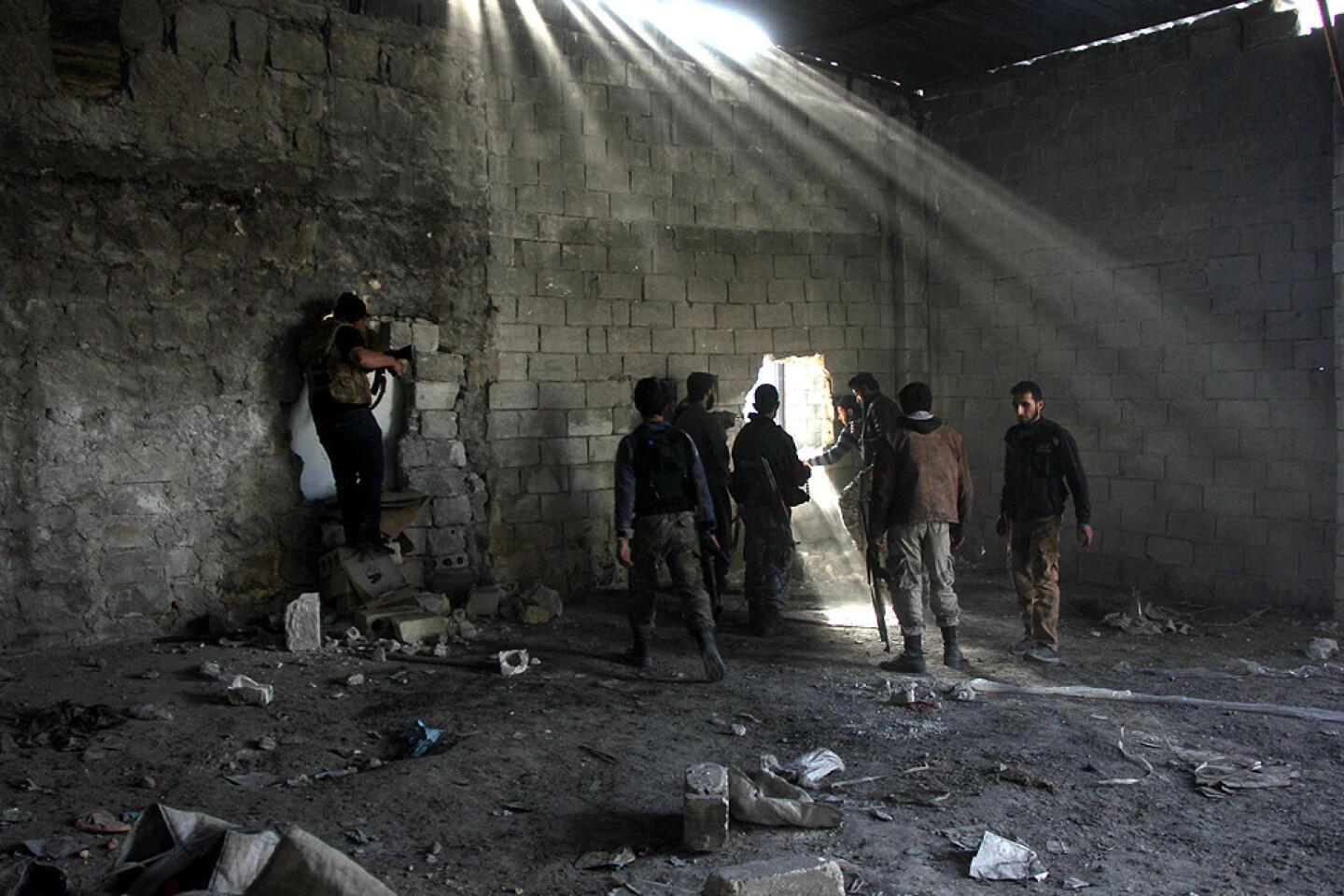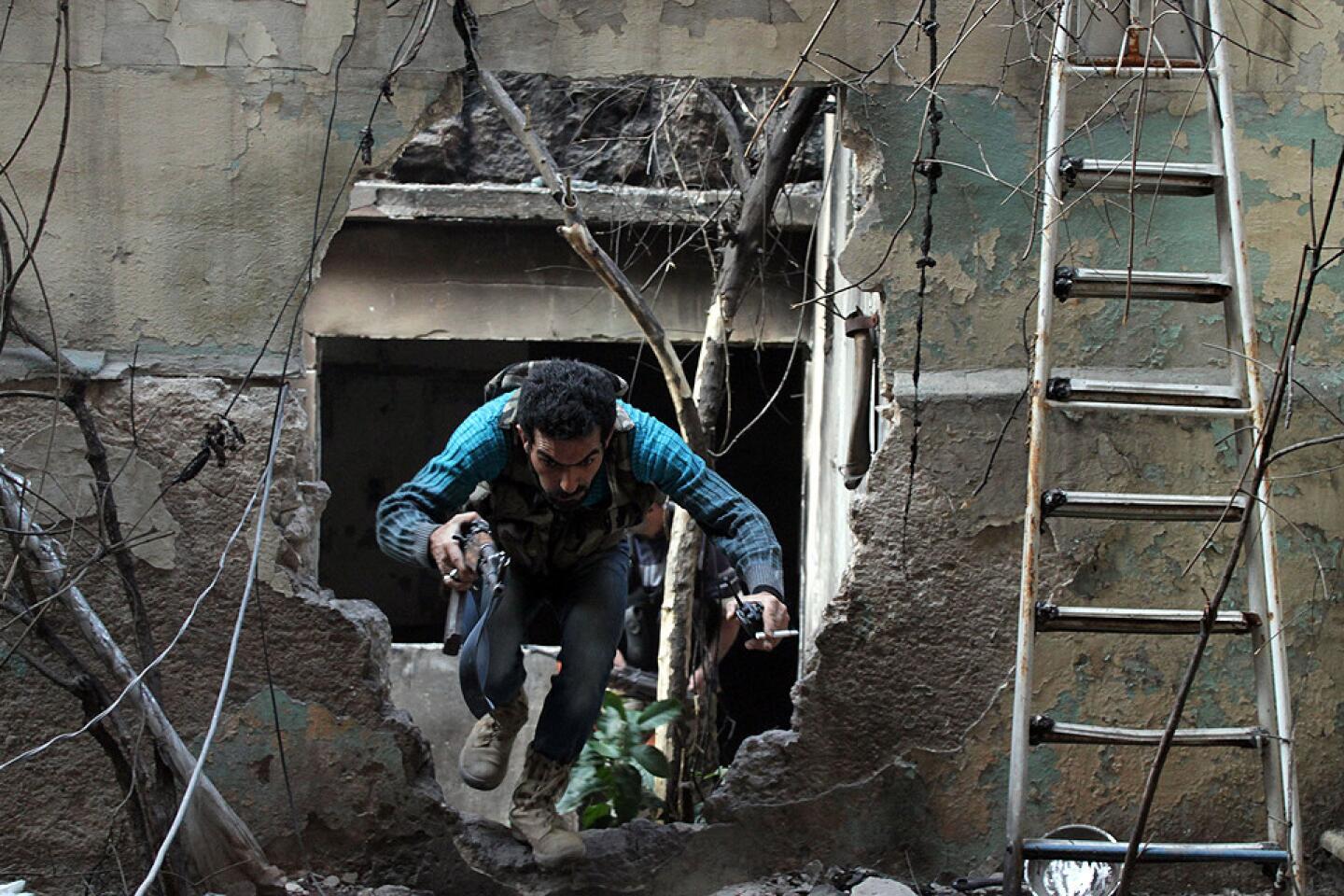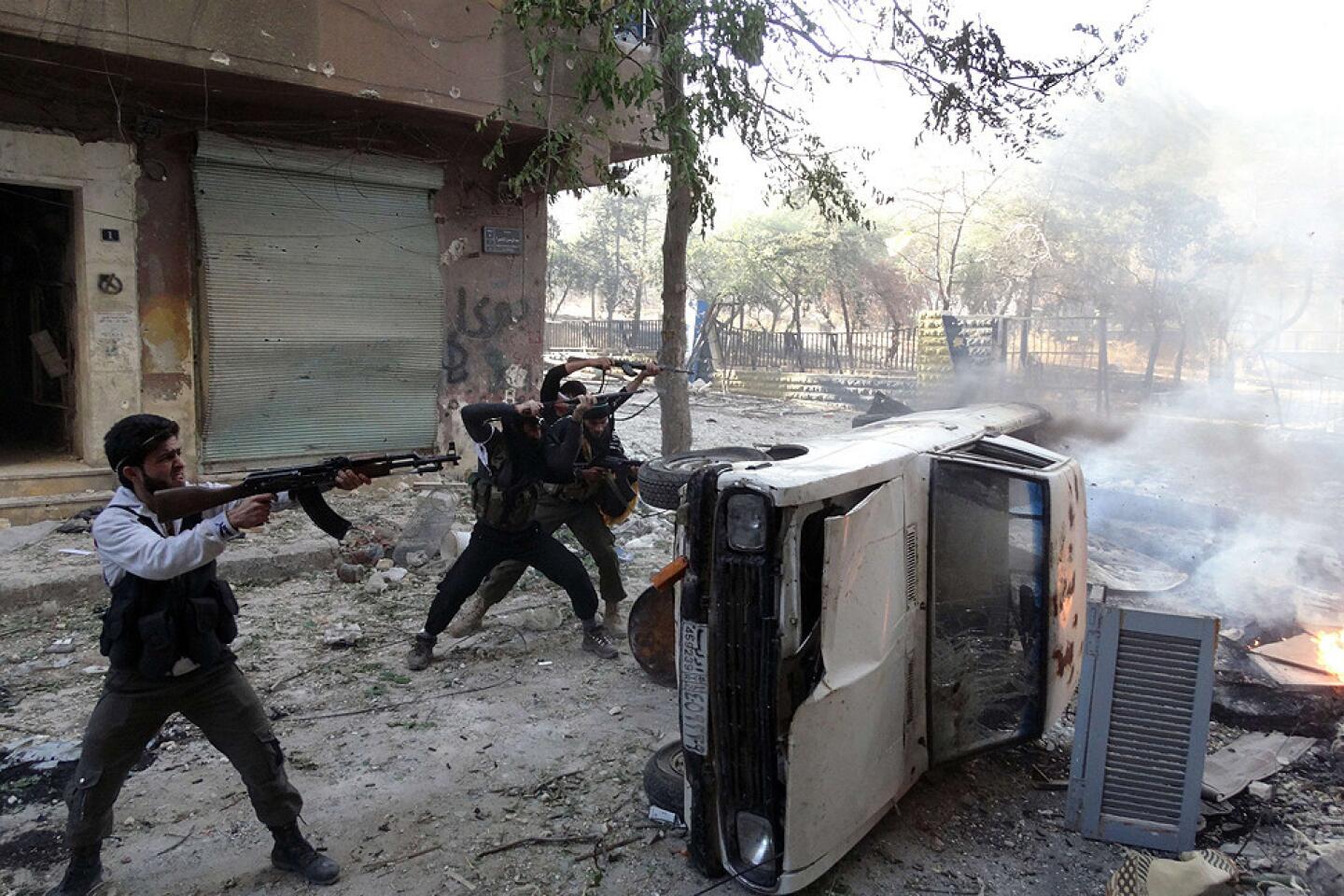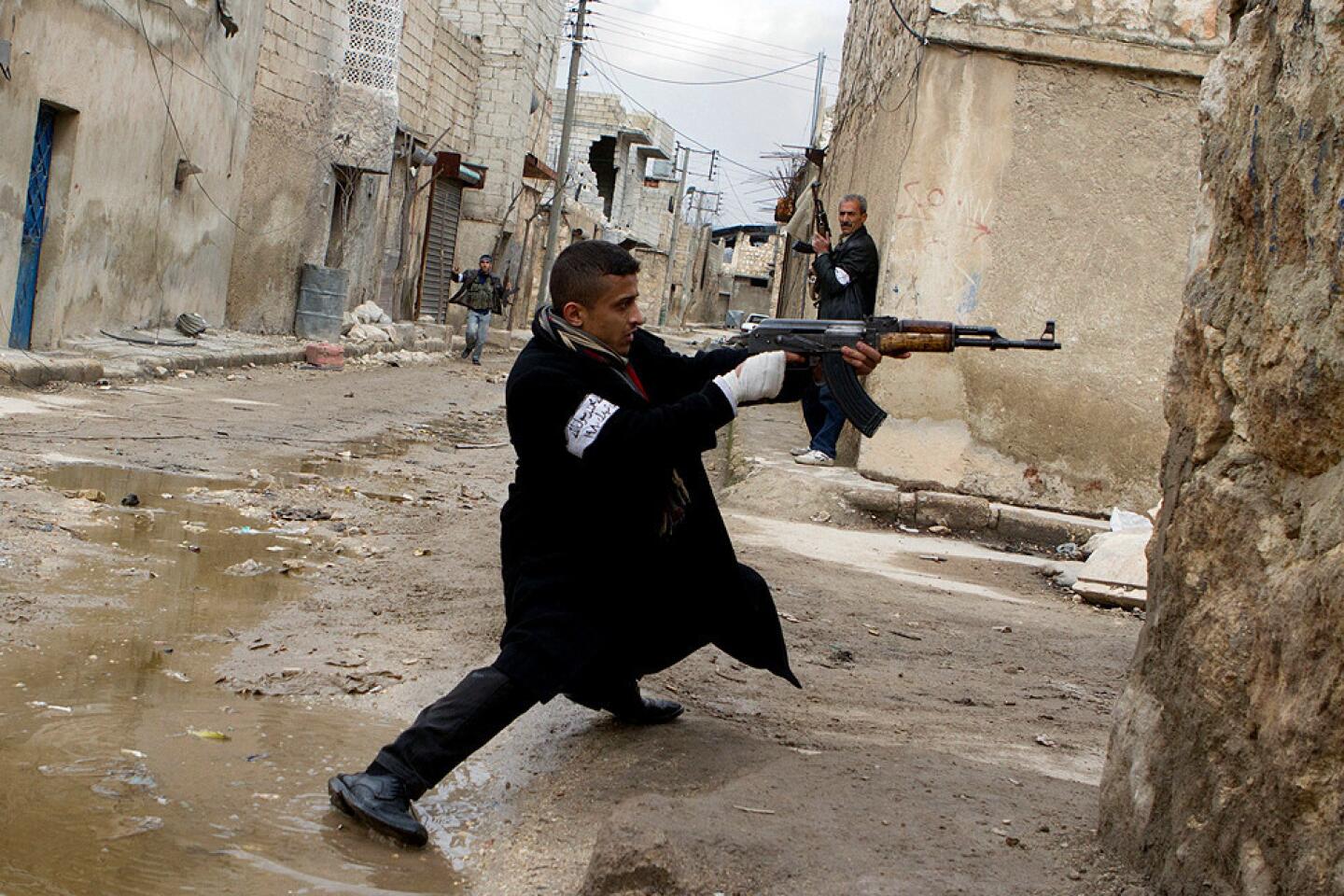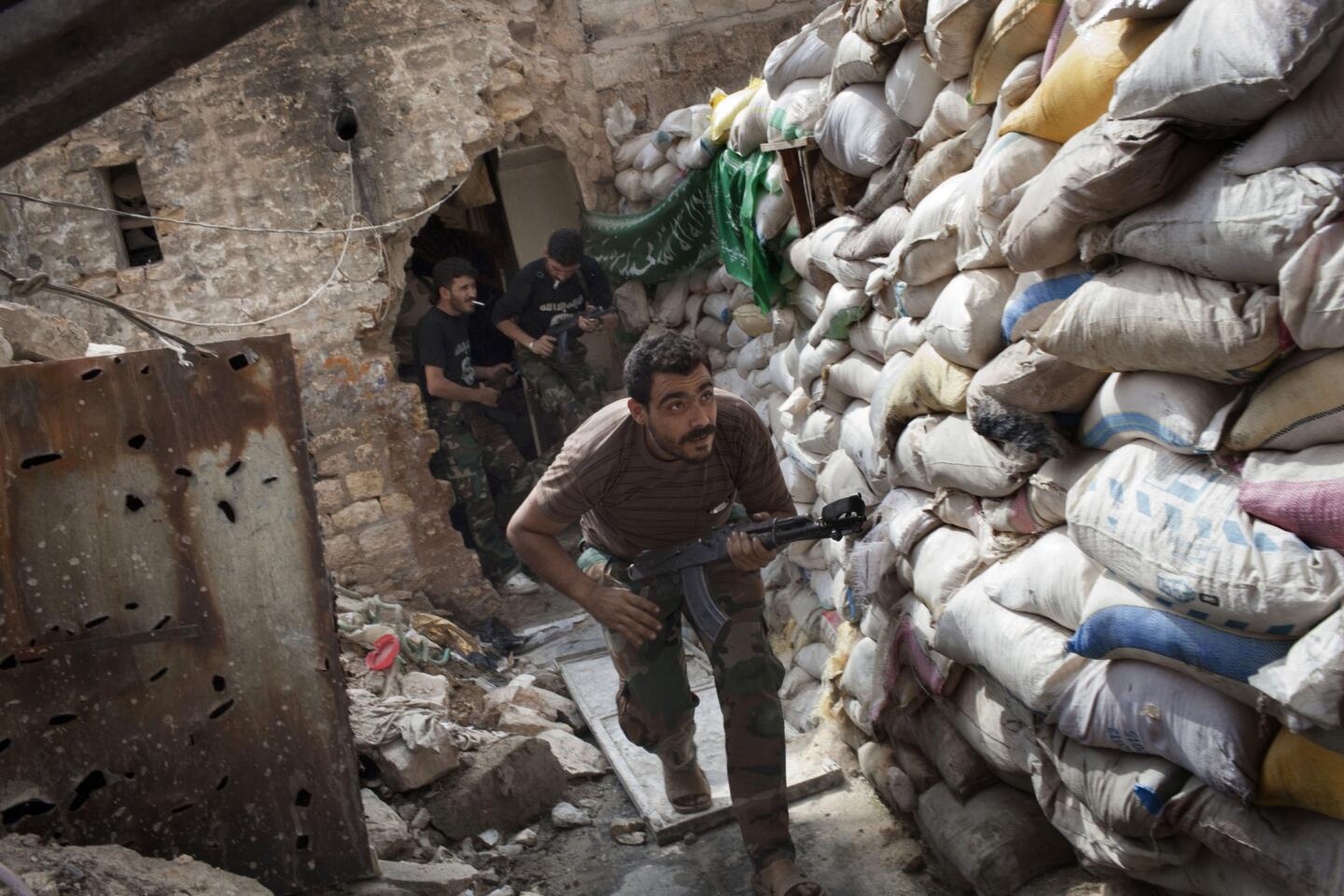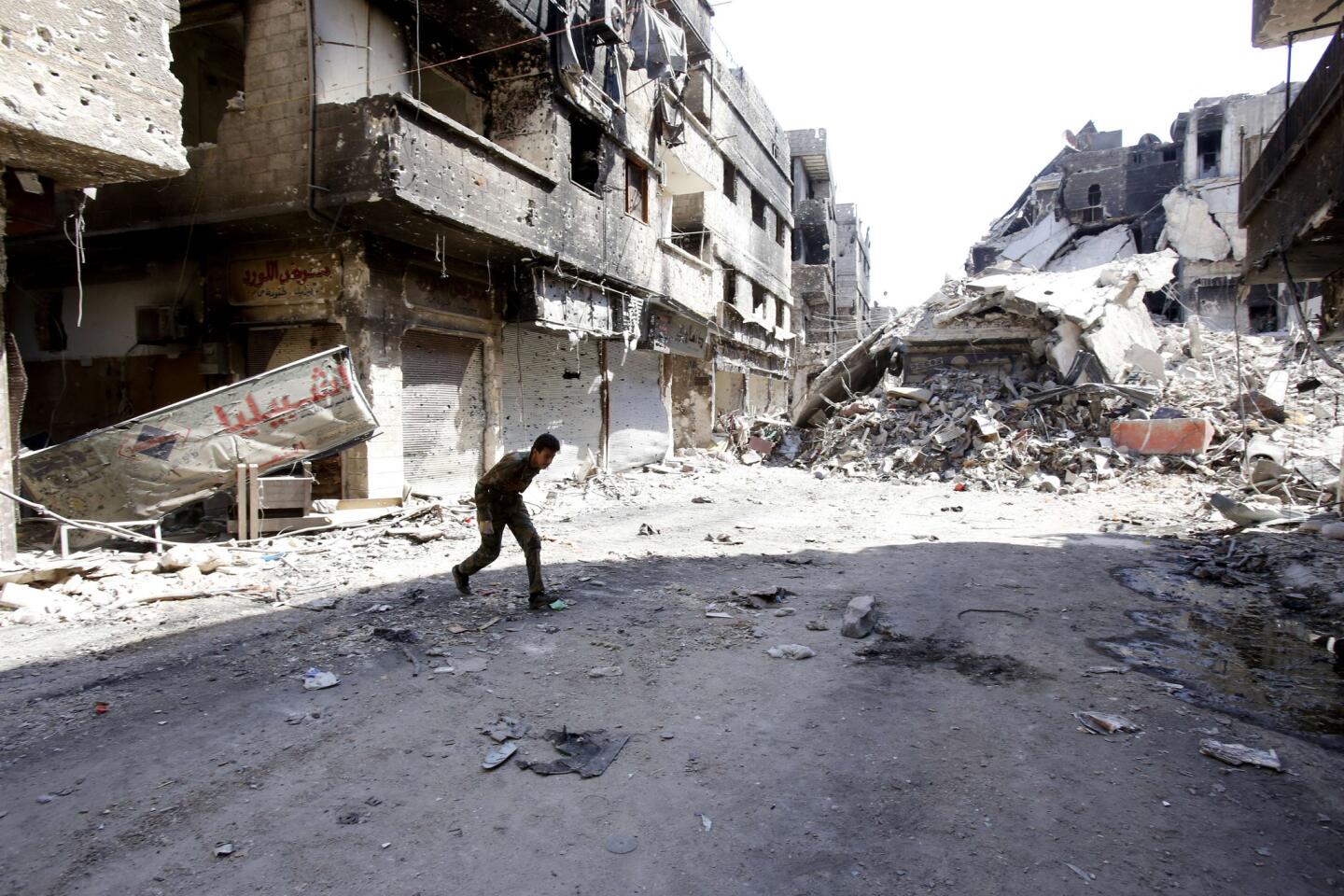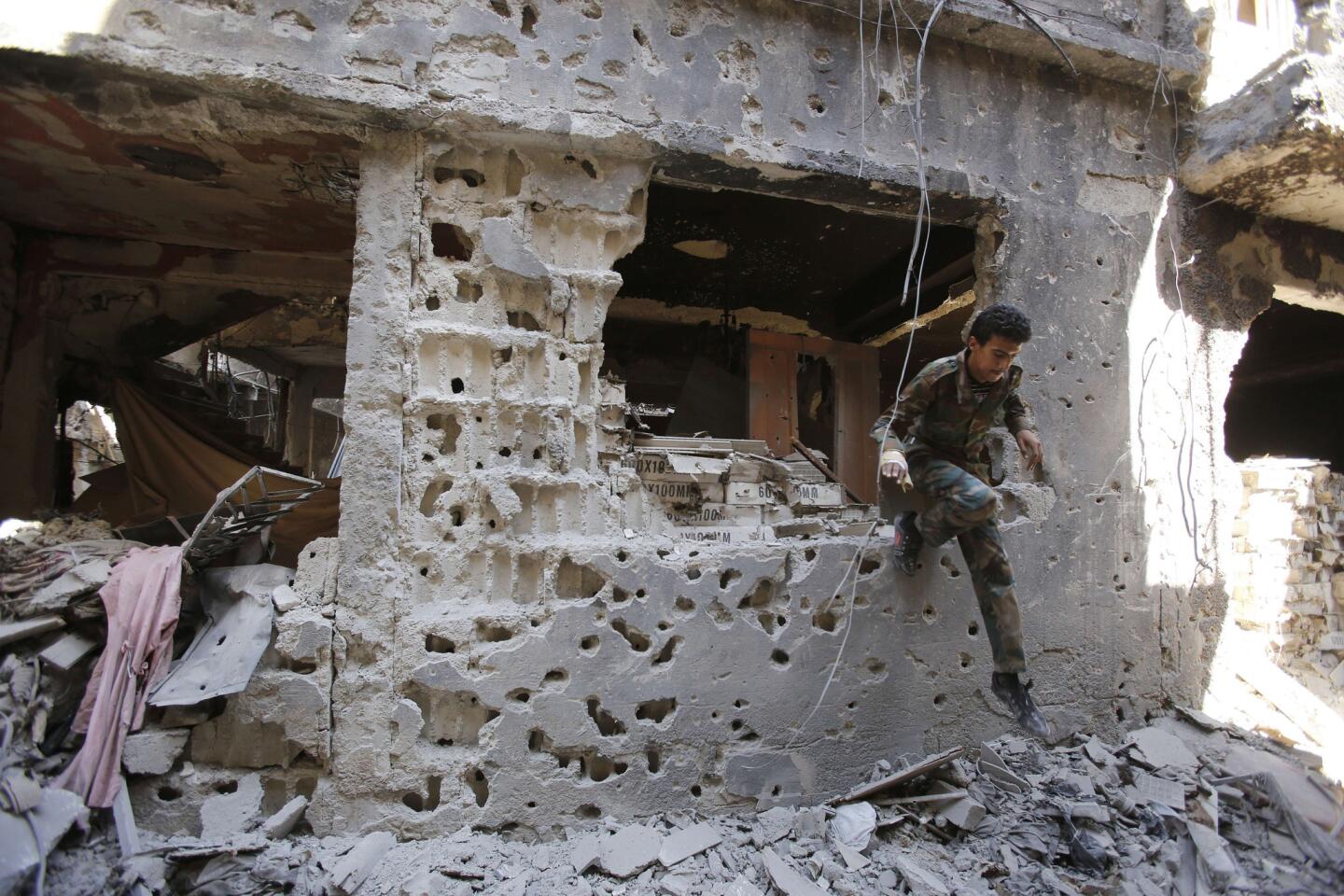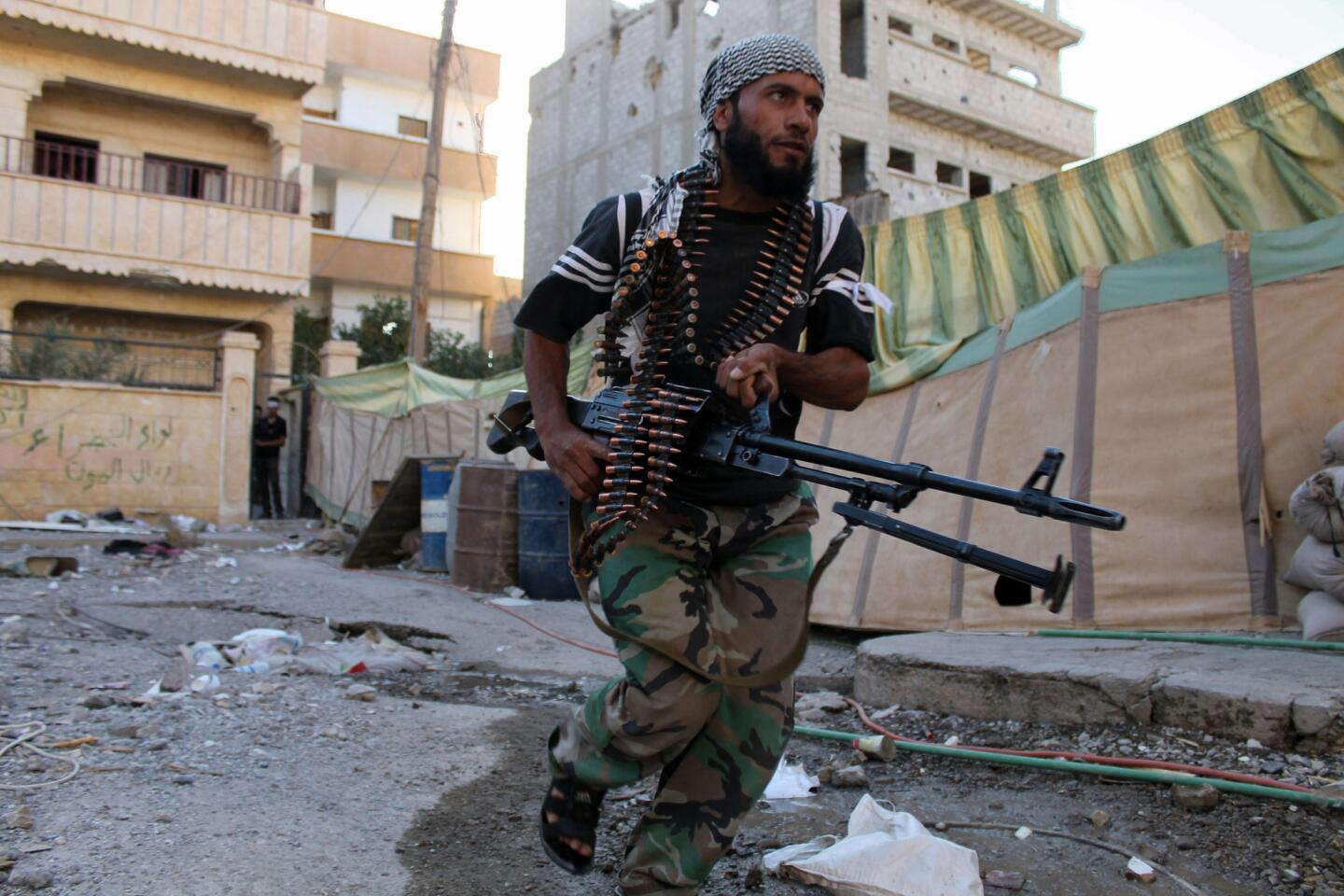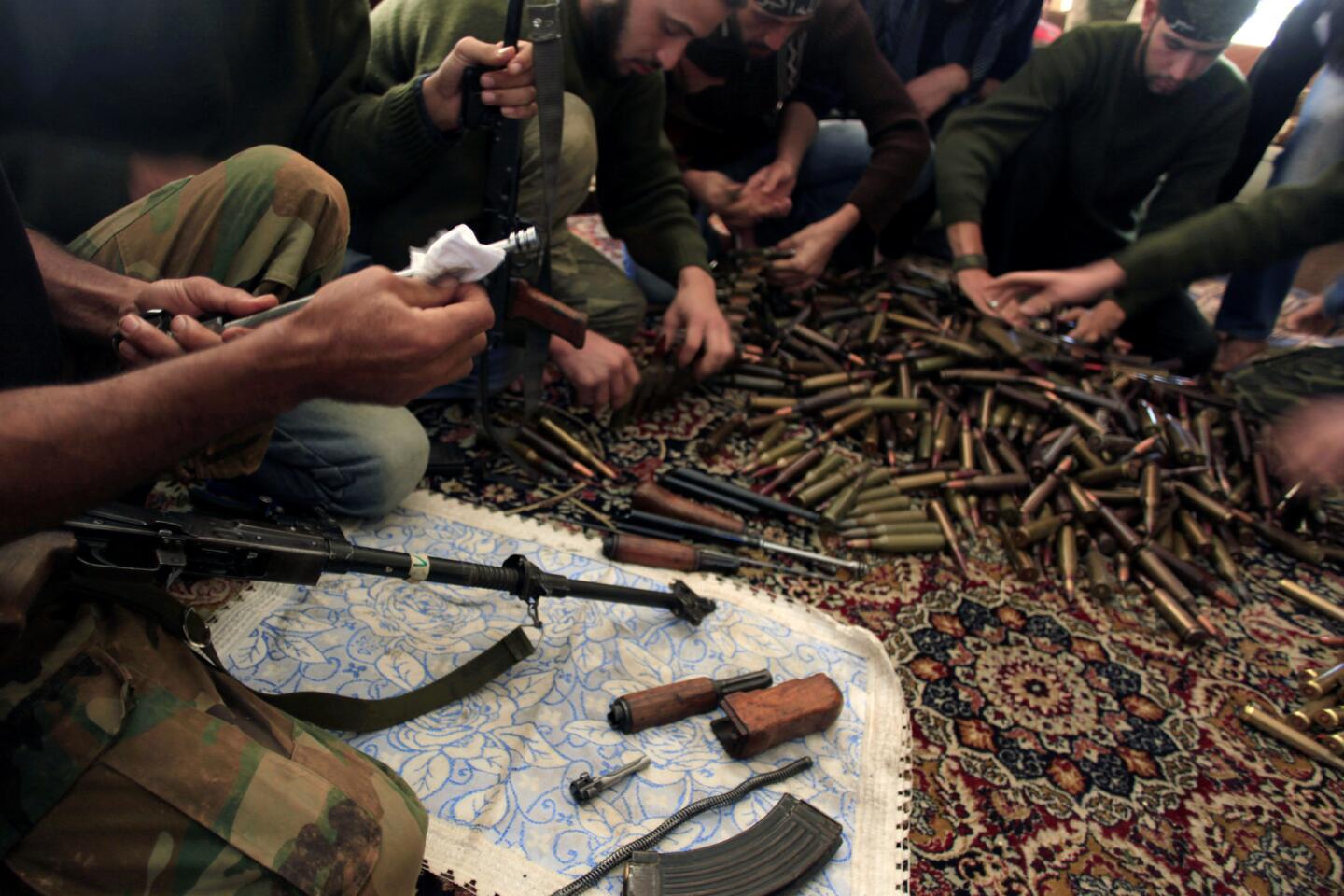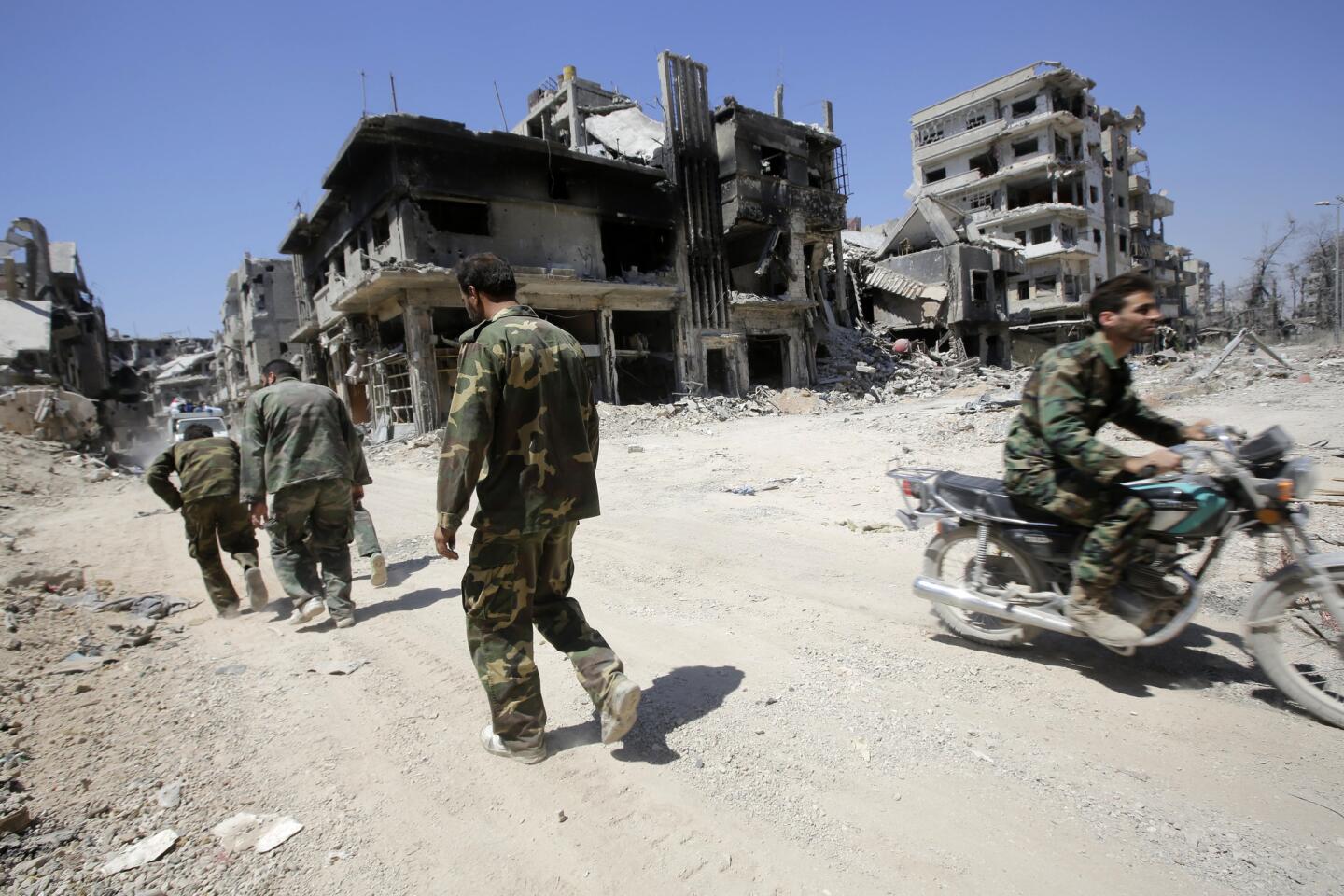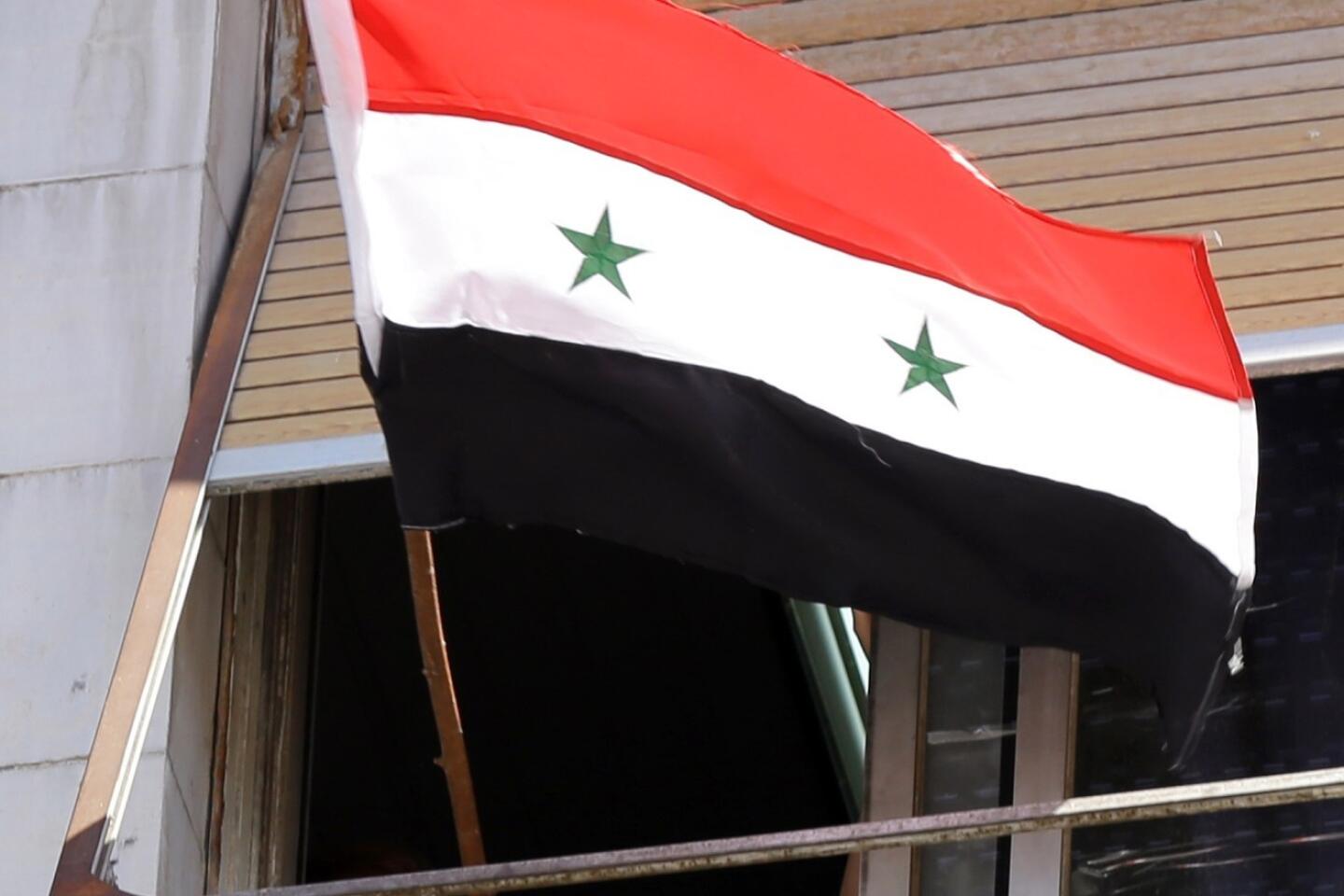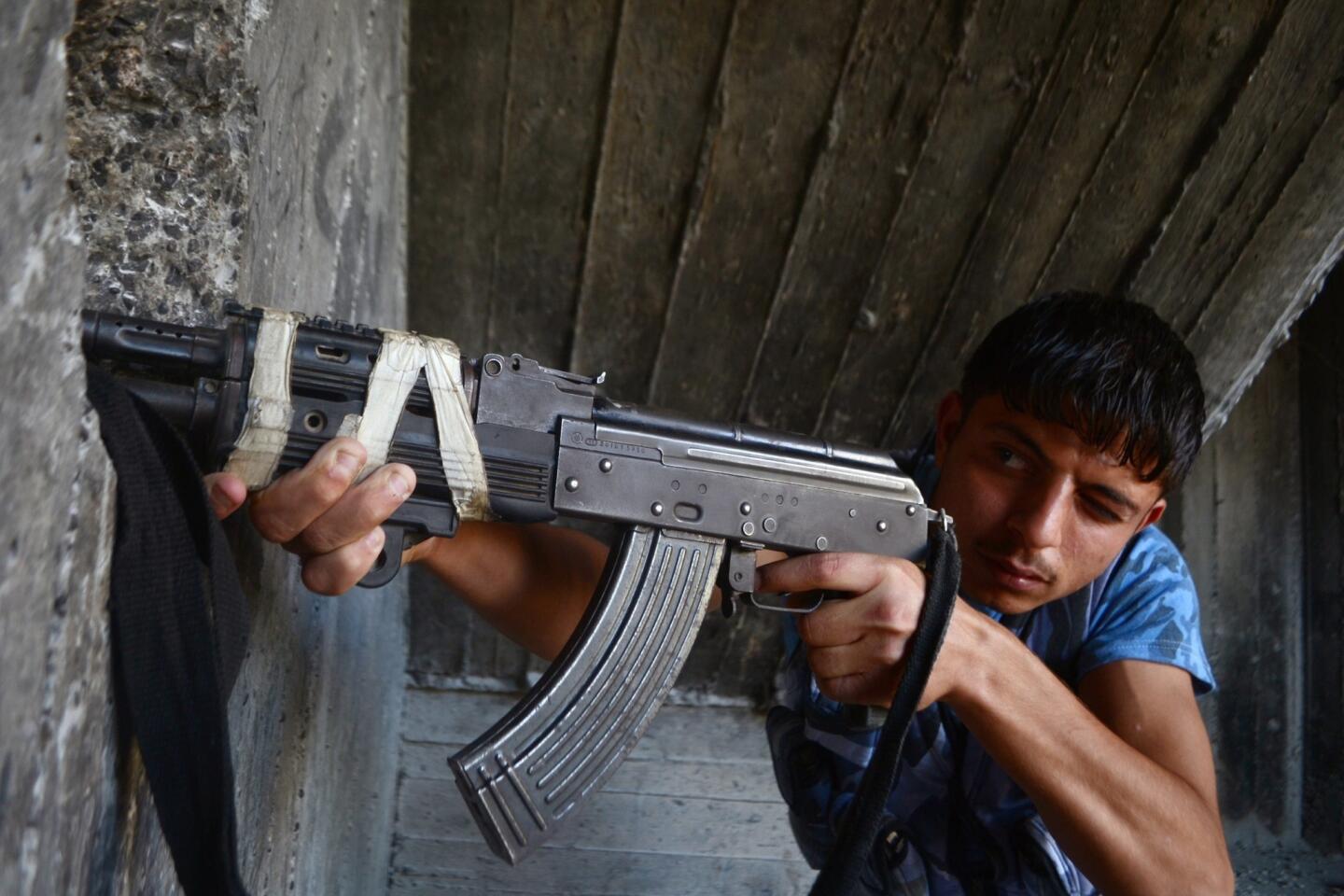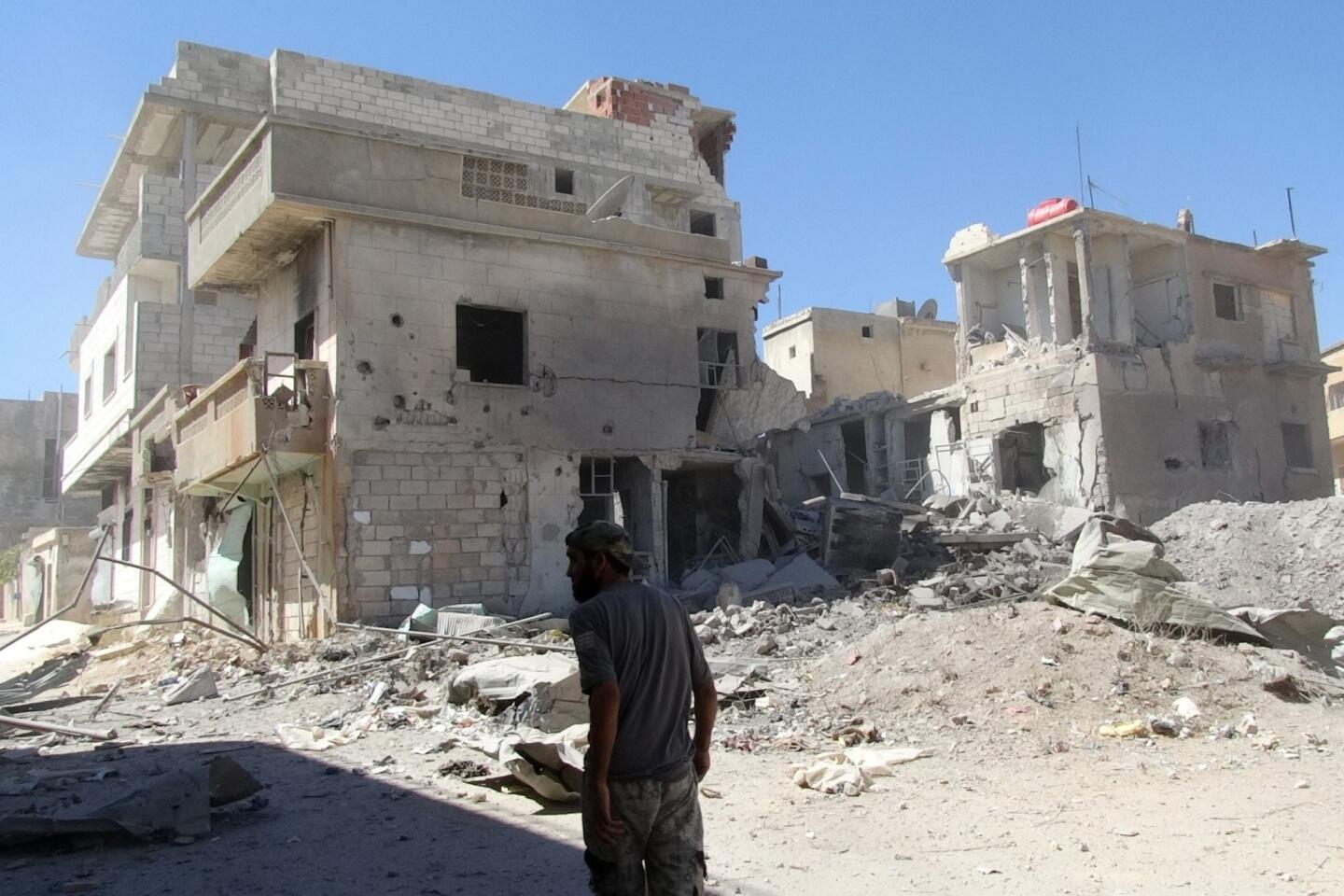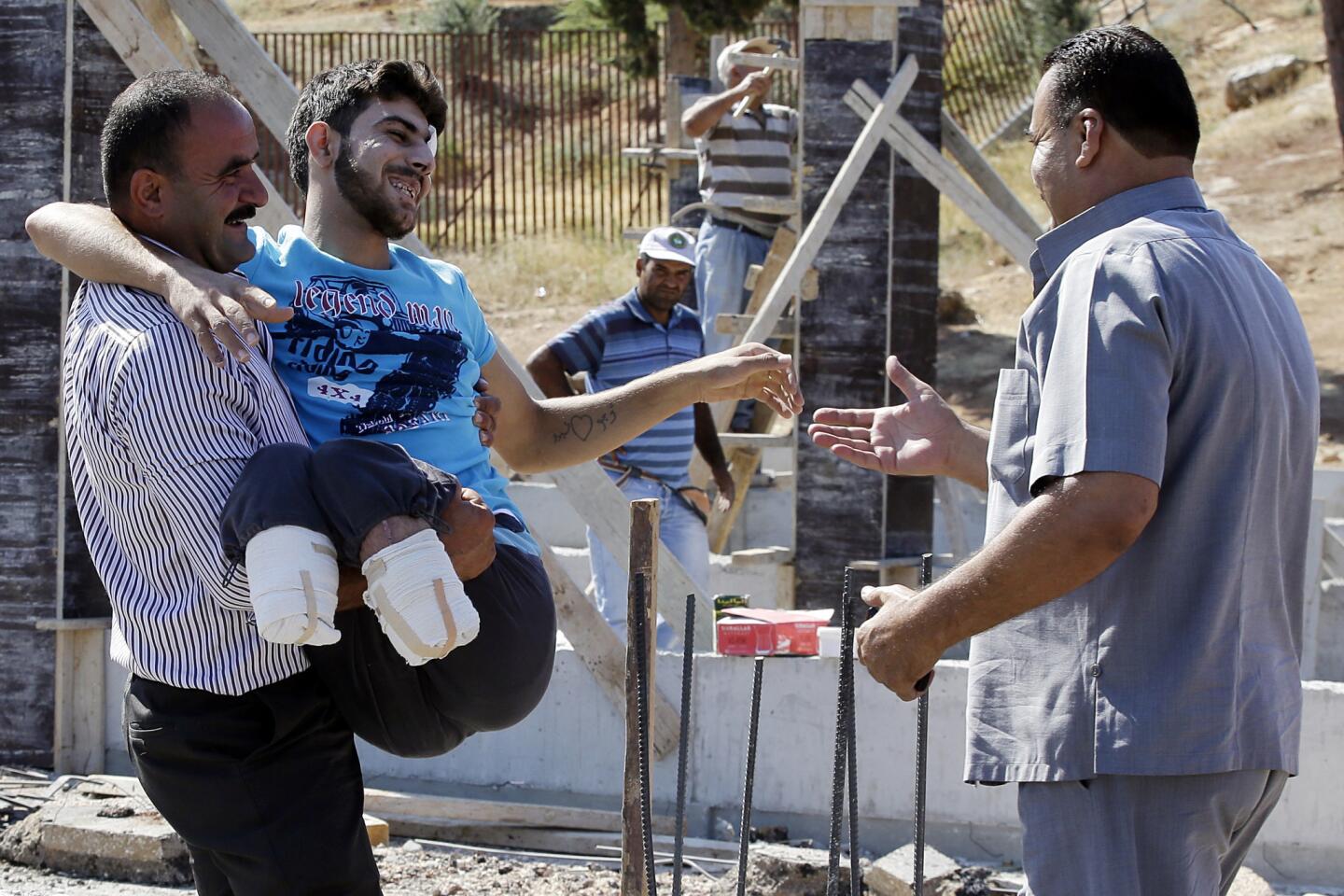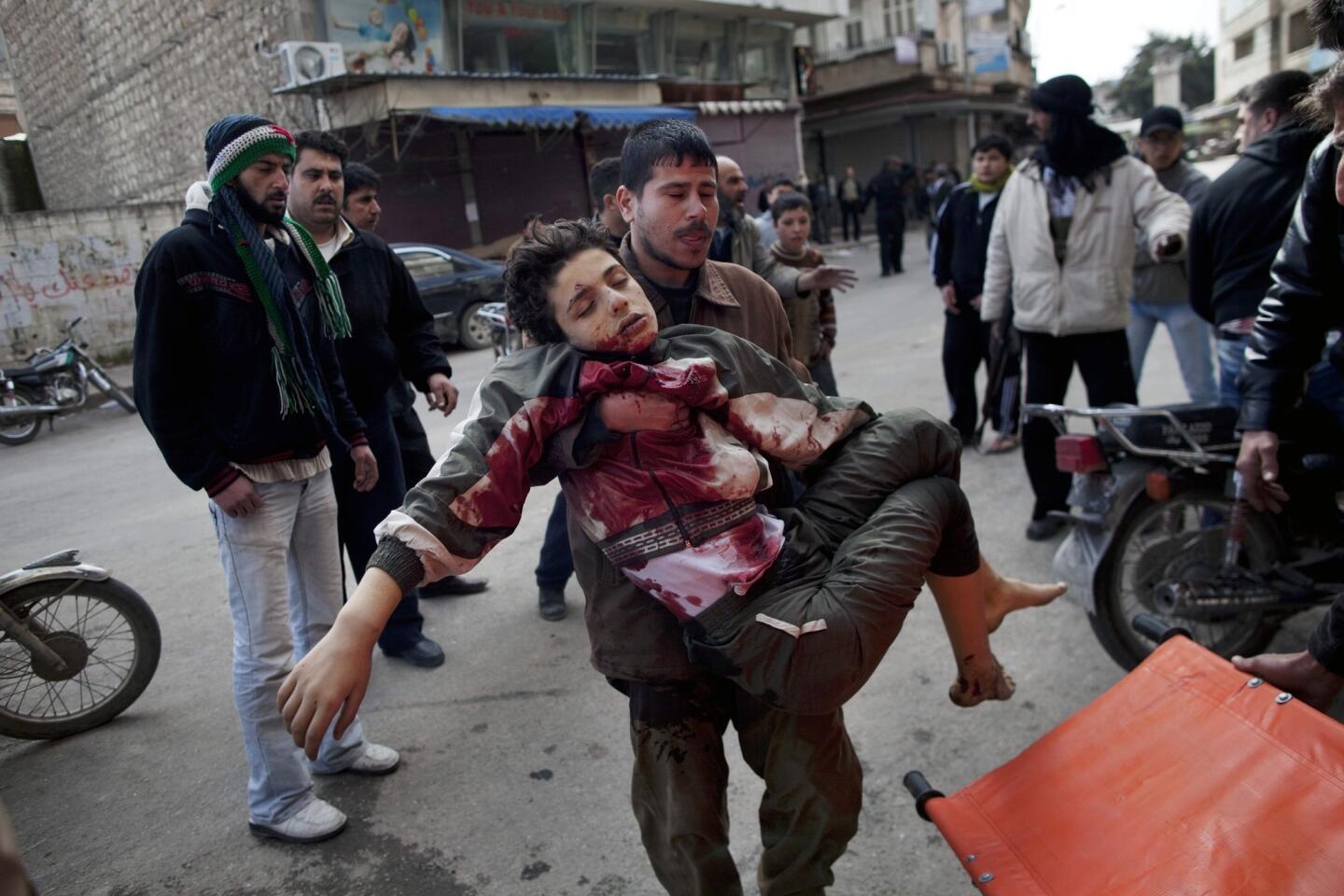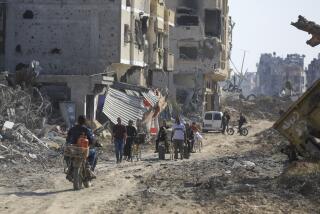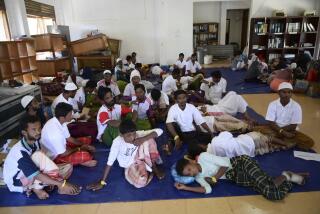Fate of starving Syrian men evacuated from Homs remains unknown
HOMS, Syria — They appeared like a defeated army, gray blankets draping their shoulders, baggy clothes flowing over withered frames, faces gaunt and exhausted. At least half a dozen had lost limbs; others arrived in wheelchairs and on stretchers. Some wore bloody bandages.
Many dragged heavily on cigarettes, like condemned men savoring their last smokes.
“We couldn’t stand it in there anymore,” said Wassim, 23, a scraggly survivor seated Wednesday with other men at a glass-topped round table in a once-elegant banquet hall here, now a tattered makeshift shelter on the edge of a war zone. “We just wanted to get out.”
The bedraggled assemblage of 161 men was among the latest group to be evacuated from Homs’ Old City in a United Nations- and Syrian government-backed relief effort that has drawn global attention to Syria’s humanitarian catastrophe. More than 1,300 people have been brought out of the besieged section of Syria’s third-largest city since the delicate operation kicked off on Friday.
Former residents described a hellish existence in Homs’ once vibrant core, where food was scarce and healthcare rudimentary. Snipers and shelling were constant worries.
The evacuation was made possible by a U.N.-brokered cease-fire between government forces and rebel fighters dug into the debris of the city’s battle-bludgeoned ancient quarter, under army siege for almost two years.
Organizers label the operation a success, a possible blueprint for other blockaded districts in Syria.
Women, children and the elderly have been fed, checked by doctors and allowed to go where they wish, or placed in shelters if necessary, officials say. The attacks last weekend on aid convoys that cost at least 10 lives have not been repeated this week. Some aid has been brought in to remaining residents.
But the fate of these legions of young men, many apparently former fighters or at least sympathizers, remains a major question mark.
Including Wednesday’s group, 505 men ages 16 to 54 have voluntarily departed from the Old City since the operation began. They came out in U.N. vehicles and chartered buses. The men all now face screening by Syrian security services, a process that could land some in prison on charges of “terrorism,” as the government here characterizes the armed uprising.
Fear was palpable Wednesday as the men were separated from women and children. Soldiers eyed them closely, though none of the male evacuees were handcuffed or formally treated like captives. Aid workers provided food and water.
Still, the hostility of some of the soldiers and pro-government militiamen was evident. Outraged government loyalists who have lost loved ones in Syria’s brutal, almost three-year conflict have bitterly protested the prospect that “terrorists” could be freed. That resentment hasn’t escaped the forlorn men who chose to evacuate the Old City.
“It’s very worrying,” said Abu Naser, 24, who, like others interviewed, asked to be identified by a nickname or first name for security reasons. “We don’t know what’s going to happen to us.”
His right leg had been amputated below the knee, the result, he said, of shrapnel from a mortar strike. The wound became badly infected; doctors at a makeshift clinic removed his lower leg to save his life, he said. Now, like others, Abu Naser said, he wanted to do nothing more than see his family again and put the nightmare behind him.
Those interviewed denied that they had been armed rebels; many said they had stayed in the Old City to protect their homes, or because it was too dangerous to leave. Whether or not they ever took up arms, they didn’t appear to be fearsome rebels challenging a powerful government.
“We didn’t have anything to do with politics,” said Abu Samer, another man in his 20s, as his colleagues at the table nodded in agreement.
One man, Abdullah, 23, sported a bloody bandage on his head and had trouble keeping his left eye open. On Saturday, he said, he was waiting to be evacuated from the Old City when a mortar shell landed where he and others were expecting to be picked up. The U.N. said the blast injured dozens of people and killed at least five. Abdullah said the left side of his face was partially paralyzed.
“I need proper medical treatment for this,” he said, fluid streaming from his injured left eye.
The men described living on wild greens and slaughtered cats, of splitting a single cheese pastry to feed a dozen people, of cigarettes costing the equivalent of $40 each. One man showed a tobacco case filled with fibers from cornstalks, a kind of makeshift tobacco.
Officials sought to reassure the edgy men that they would be treated fairly in an official screening process in coming days.
“You are all the children of Syria,” Homs Gov. Talal Barazi told them in an emotional speech at the former banquet hall, styled with Mediterranean-style decor. “And we welcome our children.... Of course, when our children are wrong, we punish them.”
President Bashar Assad had given orders that the men’s cases be handled fairly, the governor assured them.
U.N. officials expressed confidence that Syrian officials, under intense international pressure, would allow most to go free.
“I’m not worried about it,” said Yacoub El Hillo, the top U.N. official in Syria, who oversaw the sensitive operation. “I’m confident the Syrian government will treat this … in a legal and equitable manner.”
So far, Barazi said, 145 men between 16 and 54 have been processed; of those, he said, 111 were released and pledged allegiance to the government. Many were involved in logistical, media and other opposition activities, but not armed rebellion, the governor said. The other 34 were kept for additional questioning and a possible judicial process, he said. Some could face terrorism-related charges, he said, but that was still not determined. Hundreds more await processing.
The men listened intently to the governor’s speech, but many seemed too drained to take it all in. Several said they had lost at least 30 pounds during the siege.
Still, many could not consume the simple snacks they were given.
“Our stomachs aren’t used to so much food,” said Yusuf, 42.
He said he looked forward to seeing his son, Mohammed, born while Yusuf was in the Old City. Like many others, he had sent his family away.
Another evacuee held an apple in his hand with some wonderment. “I haven’t had one of these in more than a year and a half,” he said.
A man named Akram, 40, shuddered as he munched vitamin pills from a foil packet. He said he developed a kind of palsy and has periodically lost feeling in his legs and hands since eating grass last July.
After the governor’s speech, the men were escorted from the banquet hall in a shambling procession of the vanquished and starved. Under close army guard, they boarded buses that would take them to a night’s sleep and a new ordeal that will determine their futures.
Officials voiced hope that the truce would be extended and more people evacuated.
“There are people in the Old City who are just waiting to die,” El Hillo said. “The only way to save them is to get them out.”
Special correspondent Nabih Bulos contributed to this report.
More to Read
Start your day right
Sign up for Essential California for news, features and recommendations from the L.A. Times and beyond in your inbox six days a week.
You may occasionally receive promotional content from the Los Angeles Times.
